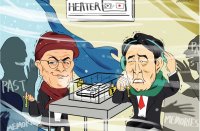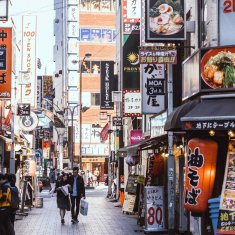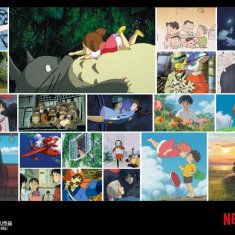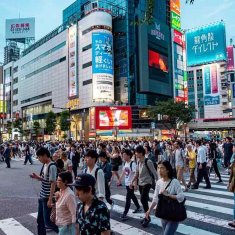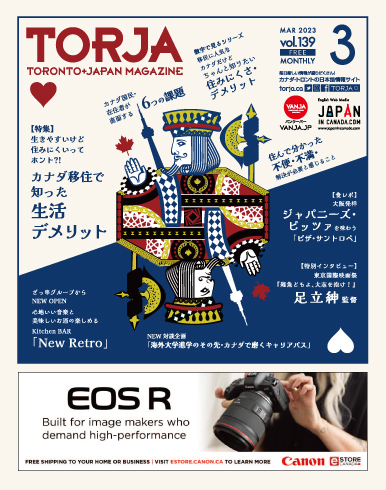Kazu Hiro, 50, formerly known as Kazuhiro Tsuji, was awarded Monday for this year’s Academy Award for best makeup and hairstyling. The four-time nominee shared the nomination with colleagues Anne Morgan and Vivian Baker for their work in “Bombshell,” a movie based on sexual harassment accusations by anchorwomen against the CEO of a television news company in the United States.
The film, directed by Jay Roach and written by Charles Randolph, stars Charlize Theron, Nicole Kidman and Margot Robbie. Theron was nominated for best actress in a leading role and Robbie scooped a nomination for best actress in a supporting role.
Hiro has made a name for himself in the art of prosthetics, having created visual effects for such films as “Men in Black,” (1997) “Planet of the Apes” (2001) and “Hellboy” (2004). He also received Oscar nominations for “Click” (2006) and “Norbit” (2007), but had to wait until 2018 for his first win.
His work transforming Gary Oldman into British wartime Prime Minister Winston Churchill for 2017’s “Darkest Hour” lead him to pick up an award alongside David Malinowski and Lucy Sibbick in 2018 for best makeup and hairstyling.
For “Bombshell,” Hiro told Dateline that he employed several methods to transform the actors into their characters. These ranged from a temporary nose plug to make Theron’s nostrils appear larger, to a prosthetic attachment to make Kidman’s nose appear “thicker and rounder.” John Lithgow, who played Fox News CEO Roger Ailes, was fitted with an attachment to make his lips appear fuller and had his hairline shaved to match that of Ailes.
“I didn’t like Japanese culture because I found it really tough to make my dream come true. so I became an American.”
There is a strong tendency in Japan where the nation celebrates high-profile personals of Japanese descent as its own, representing them as “Japan’s national pride.”
Take Kazuo Ishiguro, a British author who won the Nobel Prize for Literature—his name is undoubtedly Japanese-sounding, and the nation was celebrating the author’s award, seizing on his own declaration of an emotional and cultural connection to Japan, which he left at the age of five.
The country similarly celebrated with gusto the 2014 Nobel Prize co-winner in physics, American Shuji Nakamura, despite his having abandoned his Japanese nationality years ago. Japan does not recognize dual citizenship for adults.
Similarly, Hiro Kazu’s name flashed across smartphones and TV as the nation’s pride, but his comment after the Oscar’s took the Japanese netizens off-guard. “I hesitate to say this, but I didn’t like Japanese culture because I found it really tough to make my dream come true. so I became an American.”
Hiro was born in Kyoto in 1969 and later moved to Los Angeles to pursue film work. His first production was the 1989 Japanese film “Sweet Home,” by Kiyoshi Kurosawa. He obtained U.S. citizenship in 2019, upon which he changed his name from Kazuhiro Tsuji to Kazu Hiro.
In an interview with a LA based journalist, Yuki Saruwatari, he expressed his discomfort receiving titles such as a “Japanese representative” and the first “Japanese man” to win the award.
“Japanese people are too focused on their nationality, that majority of people forget to establish their own identities. Being stagnant is an act of degrowth. What is most important is to focus on what you do as an individual, no matter what nationality. This is one of the reasons why I abandoned my identity as Japanese. You shouldn’t be confined to categories in order to do what you want to do. I wanted to separate myself from this part of my identity.”
“Japanese education system and the society lets the outdated values live on. There is a strong sense of the collective shared between Japanese people, and it is difficult to remove yourselves from the shared old values. Caring too much about how others thinking of you is problematic and what is important is to do what you believe in. Drastically changing this environment would be difficult.”
He gave an advice to the young Japanese individuals who wish to succeed in the future. “Know what you want to do and should do, and do them no matter what others say to you. Japan is repressive, and tend to care too much about how you are perceived and if you fit into the society but that leads to conflicts with yourselves and eventually, mental illnesses. But at the end of the day, what is most important to you is your own life and you’re not living to please others, not how you fit in the society, but how you live as an individual.”
Source: https://news.yahoo.co.jp/byline/saruwatariyuki/20200114-00158572/




